
ABOUT M.K. BINODINI DEVI (1922~2011)
�
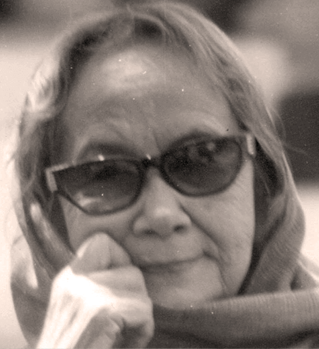 Maharaj Kumari Binodini Devi A Manipuri writer who wrote under the single name Binodini, M.K. Binodini Devi was born as a princess into a palace life. She bridged the two worlds of ancient royalty and modern life. She transcended the constraints of royalty to live to the full the life of an enlightened commoner and emerged as the iconic pioneer in the evolution of Manipuri modernism. M.K. Binodini Devi brought a deep humanism and a sense of beauty and esthetics to all her work. She made her name in the wider world as a novelist and a writer of short stories, essays, plays and screenplays of award-winning films, lyrics, poems and ballet scripts. But her work spread beyond literature and film, theater, and dance to sculpture, environmentalism, womens issues, youth, social activism and electoral politics. Her work garnered accolades beyond Manipur on the national stage and in the international arena. | ||
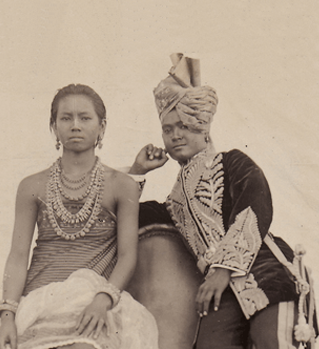 Connecting Royalty And Modernity Also known as Sana Wangol, M. K. Binodini Devi was born on February 6, 1922, the youngest of the five daughters of Maharaja Sir Churachand Singh, KSCI, CBE, and Maharani Dhanamanjuri Devi of Manipur. As the first child born after the coronation of Maharaja Churachand, M.K. Binodini Devi held a pre-eminent status among all the children of the royal household. She was the first female graduate of Manipur. Her education was the result of being the daughter of Manipurs first Western-educated monarch of Manipur and his queen, Maharani Dhanamanjuri, who assigned her English companion, Mrs. E. M. Jolly, as her daughters first English teacher. M. K. Binodini Devi got her formal English education at Pine Mount School and St Marys College, Shillong; became fluent in Bengali at Vidyasagar College, West Bengal; and was the first Manipuri woman to study art at Tagores Viswa Bharati University in Santiniketan. | ||
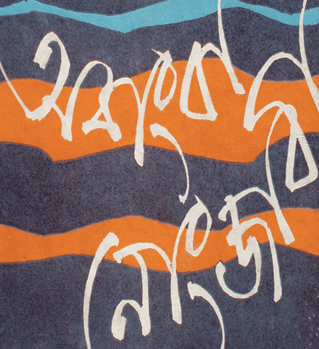 The Princess Writer M. K. Binodini Devi is that rare writer in the world who comes from the innermost circle of royalty to make a mark in literature. It was in this world that she had unparalleled and privileged access to that she turned her literary imagination to in her celebrated and Sahitya Akademi Award-winning novel Boro Saheb Ongbi Sanatombi (1979). The British period in Manipur, coeval with her life as a princess, was fondly captured in a series of essays called The Last Saheb and an essay on World War 2 from the Manipuri point of view called Yengkhom Ongbi Hemabati. Known for her horsemanship as a young woman, she wove in radio interviews on Manipurs equestrian culture as she knew it from her life in the palace, commissioned and broadcast by All India Radio. But it was in her last book, Maharaj Churachandgi Imung (2008) that her personal experience of Manipuri court life, from family to politics, offered a unique perspective that may never be captured again. | ||
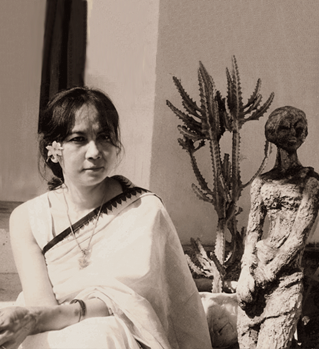 The Peoples Writer As a writer with leftist leanings, M.K. Binodini Devi was close to the Communist leader Hijam Irabot, a cousin by marriage. She was essentially a writer of the people, a princess brought up in traditional court life who became a voice for the common man. The vast majority of her literature is about the lives of common people and of the ordinary Manipuri. There is little hint, besides the grace and elegance of her prose, of her privileged upbringing in the understanding and empathy for ordinary people that come through in her collection of short stories called Nung'gairakta Chandramukhi (1965). She wrote over 50 song lyrics that became popular hits, many of them on patriotic themes, such as Lairabini Hainei Ima Nangbu Mina, Kanada Sinnani Phiral Ase and Sukna Mamla Guha Nungda. Her Nasunglangini He Ima became the anthem of the June 18 Uprising of 2001. Her 15 radio plays, like Imagi Ningthem which later was made into the internationally acclaimed film by Aribam Syam Sharma, and the plays in her collection Asangba Nongjabi (1966), are among the most loved of All India Radios broadcasts. Imasi Foundation published her song lyrics as Isei Binodinigi (2014) and her radio plays On AIR: Khonjel Lila Binodinigi (2016) posthumously as part of its archival mission. | ||
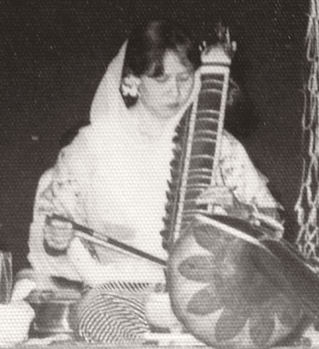 The Writer As Cultural Renaissance Figure Maharaj Kumari Binodini Devis home with its open rehearsal sangoi in Yaiskul Police Lane, built on the homestead of her mother Maharani Dhanamanjuri Devi, was Manipurs artists salon for over four decades. It was in this gathering place, where artists came and went freely, that she co-founded Roop Raag, the seminal and influential arts group of post-War Manipur in 1960, and LEIKOL, the noted womens writers circle . Here, Aribam Syam Sharma set her lyrics to music, and Nongmaithem Pahari, Aheibam Buddhachandra and Chongtham (née Ayekpam) Kamala brought them to life as some of Manipurs best-loved modern music. Arambam Samarendra rehearsed in a Manipuri Macbeth and mounted his celebrated play Dasha in her sangoi. It was here that Ratan Thiyam set up Andha Yug, his very first theater production, featuring Yengkhom Roma in the lead. Here, scenes of the films Lamja Parsuram, Olangthagee Wangmadasoo and Asangba Nongjabi were shot. The international award winning Imagi Ningthem was edited and dubbed in this home. Ima Kumar Maibi honed the dancing skills of Ima Dhani Maibi and 13 other maibis for the classic film Ishanou. Fellow writers like Laisram Samarendra, Lamabam Virmani, Hijam Guno, Khaidem Pramodini, Maibam Haricharan and Ningthoukhongjam Khelchandra dropped in regularly. Writers of LEIKOL came to work with her to anthologize womens writing on love in Nachom. Young artists came to visit their Imasi, royal mother in Meiteilon. The scholars among them came to interview her for their dissertations. National luminaries like Badal Sircar, Naseeruddin Shah and Amol Palekar, came to interact with their Manipuri counterparts. And in the center of it all was M.K. Binodini Devi. | ||
 The Writer As Social Activist In her writing and in her arts and social activism, M. K. Binodini Devi is recognized as a pioneer of a non-doctrinaire thinking in Manipur that borrows little from conventional modernism and is rooted deeply in Manipurs own traditions. Her works are notable for their strong, unconventional female characters and young women authors especially look to M. K. Binodini Devi, whom they call Imasi or Royal Mother, as a role mode. As a President and Founder of Leima Khorjeilol (LEIKOL), the women writers' circle of Manipur, she was also the guiding spirit for its publication of Nachom (2003), an anthology of women writers on love. M.K. Binodini Devi was a writer whose literature was not just popularized by the people who read her books. A major active presence in the social sphere, she wrote prolifically in the daily newspapers of Manipur. Even her memoir essays on her elevated life in the palace, later collected and published as Maharaj Churachandgi Imung, made their first appearance in the daily newspaper Poknapham between 2002 and 2007. These essays and others like Bhasker Manisana: The Last Saheb,about an Anglophone cousin, Yaiskul Yai, a series of portraits of colorful characters in her neighborhood, and her essays on her international travels, later published as O Mexico! Travel Tales (2004) were avidly read by the public when they were serialized in the dailies. M. K. Binodini Devi never ceased to write articles and numberless letters to the editors on contemporary events around her, from crimes against women and ransom kidnappings to the state of local rivers. Few know that she had close personal relationships with the Governors and Chief Ministers and other ministers of the state and often made personal phone calls or wrote private letters to them on issues she felt needed addressing but were too delicate to be aired publicly. Her concerns and interests went beyond her own Meitei community. She contributes articles to publications of the Nepali Sahitya Parishad of Manipur. Her essays on the Kabui Nagas of her fathers court, boldly broke the flow of her elegant prose to list all the names of the musicians of Keisamthong and Moirangkhom khuls lest they should be forgotten by future generations. She has also held elected office as was a Member of the Legislative Assembly in Manipur and founded micro-financing for women in Manipur with the formation of Manipurs first womens cooperative bank in 1973. As the first Secretary of the Jawaharlal Nehru Manipur Dance Academy, M.K. Binodini Devi pioneered the incorporation of the Manipuri martial arts called Thang-Ta into the canon of classical Manipuri Dance and drew traditional maibis into its teaching faculty. An elegy to the brow-antlered deer, the essay was the basis for her script for Keibul Lamjao (1984), a dance-drama she wrote when she ran the Jawaharlal Nehru Manipuri Dance Academy. It was based on Thoibidu Warouhouee, her 1972 essay on the states wetlands and wildlife that ignited environmental awareness in Manipur. Her The Nonggoubi Project was a series of community actions taken in 2002 to clean up the Nambul River. In 2016, Imasi Foundation revived her Loktak Isei (Ballad of Loktak, 1991), a dance-drama on the wetlands of Manipur, as part of its archival mission. | ||
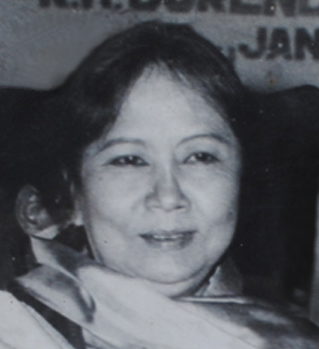 National And International Prominence Although M. K. Binodini Devi is known best for her writing, she was also an accomplished sculptor, having been an art student at Tagores Santiniketan. There, she became the muse of the Indian sculptor and painter Ramkinkar Baij. Portraits and sculptures of her by Baij are in the Gallery of Modern Art in New Delhi and were recently shown in New Delhi, Mumbai and Bangalore. Their relationship was fictionalized in Dekhi Nai Phire (unfinished) by the late celebrated Bengali novelist Samaresh Basu, with illustrations by Bikash Bhattacharjee, another contemporary Bengali painter. She has also translated into Manipuri the works of Bengali writers such as Rabindranath Tagore, Shankar and Badal Sircar. Many national luminaries in the arts such as actor Naseeruddin Shah, actor-director Amol Palekar, playwright Badal Sircar, novelist Mulk Raj Anand, writer Samaresh Basu, director Ketan Mehta, dancers Maya Rao and Sonal Man Singh, and cultural scholar Kapila Vatsyayana made it a point to visit her in her home in Yaiskul. She helped establish Manipuri Dance in Kolkata by mentoring the Sangeet Natak Award winning choreographer Priti Patel. Internationally, M. K. Binodini Devi took the first all-Manipuri dance troupe on a tour of Latin America, North America and Europe in 1976, resulting in her collection of travel essays called O Mexico! Lamkoi Wari (2004). But it is her work in film that of her nine feature films and four documentaries, her collaborations with director Aribam Syam Sharma that M.K. Binodini Devi had the most international impact. Their film Imagi Ningthem (My Son, My Precious) received the Grand Prix at the 1981 Festival des 3 Continents at Nantes; their documentary Sangai, Dancing Deer of Manipur received the British Film Institute Outstanding Film of the Year Award for 1989; and their feature film Ishanou (The Chosen One) was an Un Certain Regard selection at the Cannes Film Festival in 1991. Their films garnered international acclaim at other international venues such as the Museum of Modern Art and Lincoln Center in New York. A program of a selection of the films they made together was screened at the Brooklyn Academy of Music in New York in 2000. M. K. Binodini Devi was honored with the Sahitya Akademi Award in 1979 for her novel Boro Saheb Ongbi Sanatombi. The Sahitya Akademi also commissioned Binodini: A Writers Life (2001), a documentary film on her literary career, directed by Aribam Syam Sharma. In 2007, the Sahitya Akademi selected her for their Eminent Senior Writer Award. Other awards include the Jamini Sunder Guha Gold Medal in 1966 by the Manipuri Sahitya Parishad for Nung'gairakta Chandramukhi, her collection of stories; and the 2002 Kamal Kumari Foundation Award for Culture. In 1976 she was awarded the Padma Shri (India's national honors list) by the President of India for her contribution to music, drama, dance, film and literature, She subsequently returned the award in 2001 in protest to plans to alter Manipurs historical boundaries. But the awards that M.K. Binodini Devi loved the most was that her stories like Charik Pareng and Thoibidu Warouhouido, and her novel Boro Saheb Ongi Sanatombi, are taught to young people in Manipurs schools and colleges today. L Somi Roy © 2015 | ||









